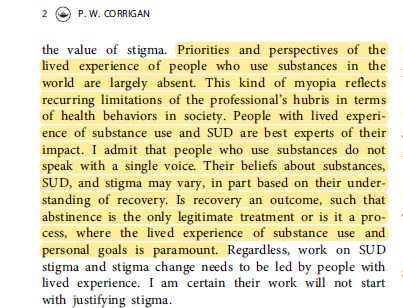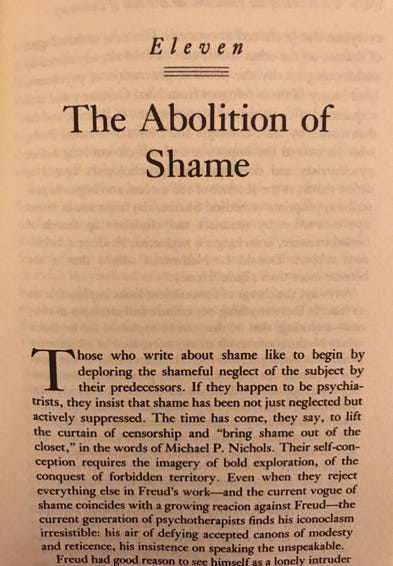A Recent Commentary in Addiction Research & Theory on Stigma
Sensible pushback on 'destigmatization' from within the Academy
Having just published my essay on destigmatization in mental health, I wanted to share a recent set of papers1 I came across that appeared in the academic journal: Addiction Research & Theory on the issue of stigmatization in mental health and psychiatry, in particular as it relates to substance use disorders (SUDs) and addiction. I think readers of my Substack not familiar with ‘academic discourse’ as it appears in journals will appreciate seeing this brief breakdown below as it touches upon all of the points I make in my essay on destigmatization. I will mostly follow the thread I did on this set of papers on X to keep things simple and as brief as possible while capturing the substantive content of the target comment and commentaries with robust fidelity.
The target article is by Michael Vanyukov and is entitled “Stigmata that are desired: contradictions in addiction.” The basic claim that Vanyukov lays out in his target article comment is that efforts to ‘destigmatize’ mental illness conditions and behaviors are misguided and internally incoherent. This is because the claimed stigmatizing of these conditions and behaviors which has led to maltreatment and mispractice with afflicted individuals, in particular those suffering from substance use/addiction mental illness, has become conflated with appropriate—and clinically useful— ‘prosocial disapproval’ of lethally dangerous behavior.
Here Vanyukov notes that the concept of stigma as currently applied by both professionals and lay persons is a synthetic blend of two distinct elements: malign mistreatment and justified disapproval of behaviors harmful to individuals and society. Although Vanyukov does not articulate this, I believe a strong case can be made that the conflation between malign aspects of stigma and justified disapproval of culturally and individually destructive and harmful behaviors has been intentionally manipulated by many within the activist academic mental health class so as to provide motivation and impetus for their efforts to destigmatize mental illness to the point of normalizing it.
There are three rejoinders to the target comment. Two of the rejoinders are largely in agreement and laudatory of the target comment, only making more fine-grained points or extending some of the thoughts, claims, and implications of the observations and ideas laid out in the comment. The rejoinder by Heyman below further underscores the important distinction between social disapproval and ‘stigmatization’ in the negative sense. Indeed, throughout history ‘prosocial cultural stigma’ of behaviors and pathogens have been recorded. There is good reason to believe that such ‘prosocial cultural stigma’ phenomena are likely evolutionary-preserved mechanisms that aim to inoculate or prevent public health disasters in society. This concurring commentary also leads with an important point given the widespread censorship and censure of 'heterodox' or alternative views on politically-relevant issues within the ideologically-captured Academy, especially within the social sciences, psychology, and psychiatry.
The rejoinder by Baumeister & Andre below highlights the element of personal agency in addiction and substance use-related conditions. More specifically, the view that those suffering from substance use conditions have at least some free will to ameliorate their condition. Although it may be considered to be 'insensitive' by some, as Christopher Lasch noted decades ago in relation to what he perceived as a loss of personal conduct standards in society, "caring is no substitute for candor."
The rejoinder by Corrigan is the lone dissenting rejoinder. It makes the case that stigmatization is never justified, and focuses on the ‘lived experiences’ of afflicted individuals as a basis for suggesting that professionals who suggest prosocial disapproval of harmful substance use behaviors are warranted demonstrate a hubristic myopia that ignores the unique views of ‘people with lived experience of substance use.’ This dissenting comment, with its 'lived experience' language so characteristic of the postmodernist view of 'emancipation from [societal] convention,' AKA: 'liberation', is not a surprise given the ideological capture in the Academy which is organized around the lived experience of ‘oppressed individuals.’
In his response to the reviews, Vanyukov clearly tackles the 'claims' of the dissenting commentary and again highlights that 'societal disapproval' which is both culturally responsible and necessary for humane civic functioning has been conflated with malicious 'stigmatization.'
In the response, Vanyukov also draws upon a prior essay by Dr. Sally Satel making many of the same points about the problems and internal contradictions with viewing the ‘stigmatizing’ of addiction as necessarily malign or counterproductive to treatment efficacy. Even when it was published in 2007, it was cutting against the grain of ‘established orthodoxy’ as noted by the pearl-clutching reactions Dr. Satel describes receiving for her views on the issue from the National Association of Alcohol and Drug Abuse Counselors and from the audience at a debate at the annual meeting of the College on Problems of Drug Dependence. In that essay, Satel makes the argument that “shame, or the prospect of experiencing it, can be an effective deterrent [to substance abuse and addiction].”
As I have discussed elsewhere, renowned thinkers such as American historian, moralist, and social critic Christopher Lasch saw the value of shame in facilitating healthy civic functioning, and as a constraint limiting unbridled cultural decadence and an unmitigated welfare state.
It is heartening to see both the target comment along with the rejoinders published in a well-recognized academic outlet focused on research and scholarship at the interface of addiction, substance use, and mental health. I say heartening for the very reason outlined in the Heyman rejoinder which correctly points out the views and perspectives such as those of Vanukov, as well as the authors of the concurring commentaries, concerning the use of ‘stigma’ in relation to addiction and substance ab(use) is grounds for strong censure in the prevailing ‘social justice’ ideological capture of the Academy, especially within psychology and psychiatry.
If you would like to read the full set of comments, please feel free to e-mail me.
Cite as: https://doi.org/TK • PDF












Science nor shame has any effect of an addict in the grip of their affliction. Does either have a preventative effect? I doubt that as well. Having lived with addictive behaviors in my own life for decades and now having 14 years in active recovery, I can speak to the shared and lived experience aspect of treatment. I maintain a very close relationship with a very large treatment organization and I’m dismayed to see fewer treatment professionals with any personal experience. The 12 steps of AA and other programs are non-scientific and have helped millions of people get free of the grip of addiction.
I do find the argument around the “slipping of societal standards” of behavior compelling. At the same time humans have been acting shamelessly for millennia...the difference now is that we’re able to witness much more of it due to 24/7 media and the Internet.
Good piece from what this layman could pull from it.
Thanks.